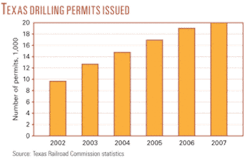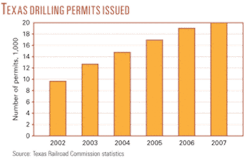Cleanup fund gets attention
Environmental cleanup funds rarely generate much attention. But the Oil Field Cleanup Fund (OFCU), under authority of the Texas Railroad Commission, (RRC) has been the subject of debate for more than a year.
The debate centers around a drilling permit backlog that has developed as RRC is falling behind in processing permit applications. High oil prices encourage more drilling activity, which means more permit applications.
Consequently, oil companies face delays in drilling, which is why the Texas Independent Producers & Royalty Owners Association (TIPRO) became involved.
RRC members voted unanimously on Sept. 23 to authorize the use of as much as $750,000 from the OFCU as emergency funding to hire contract help and pay overtime for RRC employees to reduce the backlog in permit processing.
Normally, OFCU is used for plugging abandoned wells and remediating contaminated drilling sites. As permit applications have gone up so has revenue from permitting fees.
TIPRO supports the interim transfer pending the September 2009 implementation of a new state budget. The RRC plans to ask the 2009 Legislature for OFCU reimbursement from the state’s general revenue.
OFCU revenue climbs
The fund’s revenue is forecast to reach $33 million this year, RRC said. Currently, state law dedicates this money to the OFCU for well-plugging expenses, but that could change.
“Since the fund has been highly successful in its mission—reducing the number of unplugged abandoned wells from over 20,000 to under 8,000 today—now is a good time to review the statutory limits on RRC funding streams,” TIPRO said.
TIPRO, the RRC, and the State Issues Committee have examined multiple proposals.
RRC staff salaries have not kept pace with other state agencies such as the General Land Office and the Public Utility Commission. The difference in the same job category can be as high as $9,000/year in an employee’s salary, TIPRO said.
Separately, Midland oilman Clayton Williams asked RRC to approve money to hire more people. “You have less people and more work to do,” Williams said. RRC has 706 fulltime employees today compared with 851 fulltime employees in 1999.
In 2007, the legislature approved $2 million from the OFCU to pay for RRC staff raises. TIPRO said the state can keep transferring revenue from the fund every biennium when the RRC workload changes or the state could make a one-time revenue shift from the fund to general revenue.
Drilling permits soaring
RRC officials expect to issue 29,000 permits this year compared with nearly 20,000 issued last year. The record was 47,940 permits issued in 1981, RRC statistics show.
As of Sept. 29, the agency took an average of 40 business days to process a standard drilling permit compared with 14-21 business days to process a standard permit in 2007.
Processing time also has increased for an expedited permit. TIPRO said expedited permits can take 2-3 weeks now instead of 2-3 days.
The RRC has used money from industry fees and fines for the OFCU since 1984. During 1984-91, RRC plugged 4,078 wells. During 1992-2003, RRC plugged 16,941 wells.
Normally, operators voluntarily plug their wells. The cleanup fund is used for wells left behind by irresponsible producers.
“Times are good in the industry,” TIPRO said. “The OFCU is flush with money paid by producers, and the number of abandoned wells has dropped dramatically.” But legislators, RRC, and others are mindful of possible future oil price busts.
“One factor that has changed since the fund’s creation was the implementation of universal bonding and financial assurance in 2001,” TIPRO said. “This mechanism helped provide a financial backstop for wells that may be covered by the fund.”
Meanwhile, permit fees go into the OFCU so it makes sense that OFCU funding is applied to accelerate the permitting process.

